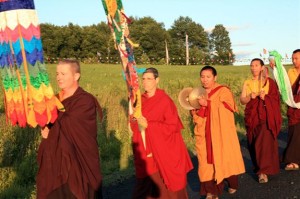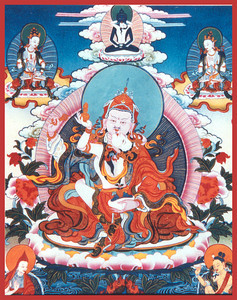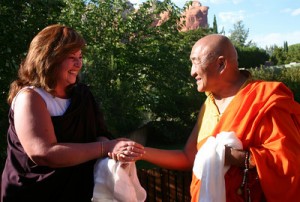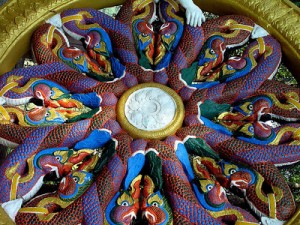![happy-valentines-day-pink-gerbera-with-a-heart-of-chocolate-by-Vanessa-Pike-Russell-150x150[1]](https://www.tibetanbuddhistaltar.org/wp-content/uploads/2010/09/happy-valentines-day-pink-gerbera-with-a-heart-of-chocolate-by-Vanessa-Pike-Russell-150x1501.jpg)
An excerpt from a teaching called True Motivation for Kindess by Jetsunma Ahkon Lhamo
In the Mahayana vehicle the Buddha teaches us that we should be more concerned for the welfare of sentient beings than we should for our own welfare. If we examine ourselves carefully, however, we understand that that is not a natural way for us to behave. The survival of self has always been our primary concern, and the habit or strong habitual tendency of preserving the ego is so deeply ingrained we do not actually understand how frequently we engage in it.
Now you might disagree, thinking, “Well, I was very kind to my family yesterday, and I was kind and generous to my friends last week. I even gave some things away.” If you think like that, think again. The only way that you can remember when you were kind is by comparison to other times. This means that there has to be a hefty measure of time when you were not kind, to be able to compare the two.
If we were truly bodhisattvas here solely to benefit sentient beings, the activity of kindness would be so all-pervasive and natural we wouldn’t be able to discriminate it. One would not know that one was kind. If someone were to say to you, “You’re really kind. Your whole life is kindness,” one would say, “Really?” because one wouldn’t know. There would be nothing to compare it to.
When we look at our kindness truthfully, we often find out it is all about us, and for the most part has very little to do with anyone else. This is a hard truth to face, but it must be faced in order to discover what the Buddha is talking about when he speaks of kindness toward all sentient beings.
Self-examination often leads us to the decision to be a kind person. When your decision is about being a kind person, however, there is actually very little true caring for the welfare of sentient beings. What you are really trying to do is to find yourself, or to like yourself, or to label yourself, to discriminate between self and other and to continue the continuum of egocentricity. When a person decides to be kind, they do so because they want to be a certain way or they want to present themselves a certain way, but generally it’s all about them.
The Buddha teaches us that when we wish to embody the virtue of compassion — when we actually decide to be kind — we should do so for very logical reasons. First, we should study cyclic existence, the cycle of death and rebirth well enough to see its faults. One of the main faults of cyclic existence is that everyone who is born will die. Coupled with this is that during the entire time you’re alive until you start to age or become extremely sick you forget that simple fact, and you do not act appropriately.
We’re all going to experience death. But the way you’re thinking now and the way you act the rest of the day will demonstrate that you’re not thinking like that. You will act like a person who does not remember his or her own death. Because the other thing that you learn about your death is that when you die you can’t take anything with you, not a thing — except the condition, or karma, or habitual tendency of your mind.
Knowing you can only take the habitual tendency of your mind with you when you die, are you going to act appropriately the rest of the day? No way. For the rest of the day, the rest of the week, we will try to accumulate as much approval as possible. “I’m going to make people like me; I’m going to make people proud. I’m going to get love. I’m going to do anything I can — lie, cheat, steal — I’ll put on an act, pretend. I’ll mask my true feelings and do anything just to get a little bit of approval. Who cares if that creates a habit of grasping? Who cares if I take only for me and don’t much care what happens to anyone else? I need that approval, that love.”
The other thing we’ll do is try to accumulate material goods for no good purpose other than that we want them. We forget we can’t take them with us. We don’t act like people who know that. We act like people who believe in some kind of hokey fairy tale or story that can’t possibly come true.
In cyclic existence we also suffer from the suffering of suffering. If we had a different kind of mind, we could see birth and death and our minds would be stable and spacious. Perhaps these events wouldn’t bother us so much.
Unfortunately everything bothers us. Everything is something we react toward, because it is the nature of our mind to react toward everything with acceptance or rejection, hope and fear. What must come from that is hatred, greed and ignorance. We either hate something, or we want it, or we ignore it. Thus, we engage in the suffering of suffering. We not only experience death, we suffer because of our reaction to death. We not only experience separation, we suffer because of our reaction to separation.
So these are the faults of cyclic existence, and what else would you do other than practice a path that leads to the cessation of suffering? You could accumulate material goods, but what good will that do? Or you could continue the habit of being hateful. What good would that do? Or you could continue to grasp. What good would that do?
The Buddha teaches us that there is an end to suffering. That end is to exit cyclic existence; and in order to leave, one must achieve liberation, or enlightenment. Upon awakening to the enlightened state, one no longer revolves in cyclic existence, because one does not have the building blocks of death and rebirth which are based on the assumption of ego, or self-nature as being inherently real, and the reaction to phenomenal experiences. That is what cyclic existence actually is–that through that means one actually creates the karma of suffering and death, the endless experience or cycle we find ourselves in.
The Buddha teaches us that to attain enlightenment, to awaken to the primordial wisdom state, one no longer accumulates karma. In fact all of that perceptual experience is pacified, in that one finally awakens to and truly views the primordial wisdom nature. So there is an end to suffering. So, if you become a spiritual person in order to be something, you’re still clinging to ego and you’ll actually never attain enlightenment by awakening to the primordial wisdom nature.
And the Buddha teaches us that this can be done through the systematic pacification of hatred, greed and ignorance, the pacification of desire, through meditation, prayer, contemplation, study, through the pursuance of enlightened activity.
© Jetsunma Ahkon Lhamo




![live-moment-relieve-stress-200X200[1]](https://www.tibetanbuddhistaltar.org/wp-content/uploads/2010/10/live-moment-relieve-stress-200X2001.jpg)
![sunrise_apollo[1]](https://www.tibetanbuddhistaltar.org/wp-content/uploads/2010/09/sunrise_apollo1-300x194.gif)
![happy-valentines-day-pink-gerbera-with-a-heart-of-chocolate-by-Vanessa-Pike-Russell-150x150[1]](https://www.tibetanbuddhistaltar.org/wp-content/uploads/2010/09/happy-valentines-day-pink-gerbera-with-a-heart-of-chocolate-by-Vanessa-Pike-Russell-150x1501.jpg)
![buddha-wallpapers-photos-pictures-autumn[1]](https://www.tibetanbuddhistaltar.org/wp-content/uploads/2010/09/buddha-wallpapers-photos-pictures-autumn1-300x224.jpg)
![whiteumbrella[1]](https://www.tibetanbuddhistaltar.org/wp-content/uploads/2010/09/whiteumbrella1.jpg)
![pbce029_buddha_lotus[1]](https://www.tibetanbuddhistaltar.org/wp-content/uploads/2010/09/pbce029_buddha_lotus1-208x300.jpg)
